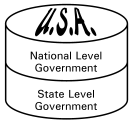
Federalism
- Definition from Stanford Encyclopedia of Philiosophy
- Discussion of Madison's #10 and his theory of federalism
- review for exam on U.S. government
- From U.S. History.Org, a summary of Anti-Federalist arguments
- Lesson plan from North Carolina Civic Education Consortium
- The most prevalent is the unitary system. In a unitary system, power is held at the national level, with very little power being held in political subdivisions, such as provinces, counties, parishes, or towns. The least common is the confederation.
- Confederations are unions of equal states, with some power being held at the national level. Generally, it has been found that conflicting interests lead to the break-down of confederations.
- The third major system is the federal system. In a federal system, the national government holds significant power, but the smaller political subdivisions also hold significant power. The United States, Canada, Australia, and Brazil are examples of federal systems.
Federalism in the United States has evolved quite a bit since it was first implemented in 1787. In that time, two major kinds of federalism have dominated political theory:
- The first, dual federalism, holds that the federal government and the state governments are co-equals, each sovereign. In this theory, parts of the Constitution are interpreted very narrowly, such as the 10th Amendment, the Supremacy Clause, the Necessary and Proper Clause, and the Commerce Clause. In this narrow interpretation, the federal government has jurisdiction only if the Constitution clearly grants such. In this case, there is a very large group of powers belonging to the states, and the federal government is limited to only those powers explicitly listed in the Constitution.
- The second, cooperative federalism, asserts that the national government is supreme over the states, and the 10th Amendment, the Supremacy Clause, the Necessary and Proper Clause, and the Commerce Clause have entirely different meaning. A good illustration of the wide interpretation of these parts of the Constitution is exemplified by the Necessary and Proper Clause's other common name: the Elastic Clause.
(Source: U.S. Constitution Online)
|
Powers of National Government Dangerous to State Governments; New York as an Example
|
The Nationalism of John Marshall's decisions: From Digital History: Judicial Nationalism John Marshall and Federal Supremacy From Suite 1010: Judicial Nationalism |